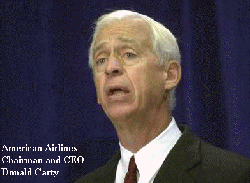AMR Execs Forego Big Bonuses, But Keep Supplemental
Pensions
 They
gave up money, favorable work rules and, in some cases, their jobs.
So imagine the reaction from American Airlines employees when they
found that top management had a secret, irrevocable trust fund set
up just in case the carrier goes bankrupt. Imagine their reaction
upon finding out that American's top executives were slated for
huge retention bonuses, in spite of the carrier's ill financial
health.
They
gave up money, favorable work rules and, in some cases, their jobs.
So imagine the reaction from American Airlines employees when they
found that top management had a secret, irrevocable trust fund set
up just in case the carrier goes bankrupt. Imagine their reaction
upon finding out that American's top executives were slated for
huge retention bonuses, in spite of the carrier's ill financial
health.
It Ain't Pretty.
"I think it's appropriate to call on the federal government, on
the AMR Board of Directors as well as the stockholders to severely
scrutinize this current management team regarding their actions,"
said an obviously enraged spokesman for the Allied Pilot's Union,
Capt. Steve Blankenship.
"The damage is done. The element of trust with senior management
of this company has been destroyed," George Price, a spokesman for
the flight attendant's union, told reporters.
A Vote, A Disclosure And A Firestorm
 Earlier this week, the three major unions representing American
workers - the APA, the Association of Professional Flight
Attendants and the Transport Workers' Union, agreed to $1.8 million
in wage cuts, reduced benefits, and thousands of layoffs. In the
case of the APFA, the initial vote was to turn down the concession
package, a move that American threatened would send it straight to
bankruptcy court and Chapter 11. So, the flight attendants voted
again the next day and narrowly passed the measures.
Earlier this week, the three major unions representing American
workers - the APA, the Association of Professional Flight
Attendants and the Transport Workers' Union, agreed to $1.8 million
in wage cuts, reduced benefits, and thousands of layoffs. In the
case of the APFA, the initial vote was to turn down the concession
package, a move that American threatened would send it straight to
bankruptcy court and Chapter 11. So, the flight attendants voted
again the next day and narrowly passed the measures.
That's when it hit: an AMR Corp. filing with the Securities and
Exchange Commission showing that, shortly after the September 11th
terror attacks, the company created a pension fund to protect
income earned by American's top 45 managers, should the carrier go
bankrupt. The SEC disclosure also showed the company had offered
huge retention bonuses to its top six leaders if they stayed on
board beyond 2005. In some cases, those bonuses amounted to twice
the executives' base salaries.

Carty: I Blame Myself
"The goal was to give senior officers an incentive to stay with
the company when many were being offered more generous packages to
go elsewhere," said American CEO Don Carty in a prepared statement
from the airline's Fort Worth (TX) headquarters. "We did not give
our senior executives a pay increase. In fact, I gave up my salary
entirely for the last quarter of 2001, and my entire senior
management team took voluntary pay cuts."

Carty admitted he wasn't totally forthcoming with union leaders
about the senior management compensation package. "I have
apologized to our union leaders for this and for the concern it has
caused our employees," Carty said. "Those executives who have made
the personal commitment to remain with American during this
financial crisis, myself included, are not here solely for monetary
reasons and we have all agreed to give up these retention payments
in order to give our employees confidence in management's on-going
commitment to shared sacrifice."
And with that, American dropped the bonus plan for those top six
executives. The airline refuses, however, to give up the
supplemental pension funds for its top 45 managers.
 That
prompted the TWU to threaten nullification of its concession vote.
It also prompted the APA to demand a full-blown investigation into
just how American Airlines keeps the books.
That
prompted the TWU to threaten nullification of its concession vote.
It also prompted the APA to demand a full-blown investigation into
just how American Airlines keeps the books.
"What more can you ask?" he said in an interview with USA Radio
Network News Friday. "Listen, what more can you ask of working
families at American Airlines, the sacrifice that they've already
given? What more? You can't. It's time that the management team at
American Airlines do even more than this. Let's have full
disclosure to the irrevocable retirement funds in the event that
this airline goes into bankruptcy."
The Supplemental Pension Plan (SEP) provides benefits above and
beyond the tax-deductible for American's top managers. American
made its first payment to the plan earlier this year and claims
it's terribly underfunded.
 "My
mistake was failing to explicitly describe these retention
benefits, and because of that, many employees felt they were kept
in the dark," Carty said Friday in a letter to employees. "Please
know that it was never my intention to mislead you. I offer you my
sincere apology, as I have to our union leaders."
"My
mistake was failing to explicitly describe these retention
benefits, and because of that, many employees felt they were kept
in the dark," Carty said Friday in a letter to employees. "Please
know that it was never my intention to mislead you. I offer you my
sincere apology, as I have to our union leaders."
Unions: Not In A Forgiving Mood
 "It requires a lot for working people to forgive,"
said Blankenship. "There's a corporate culture here that we have
worked hard not to be adversarial in. We can go to our people again
and again and say, 'Let's forgive and go along for the goodwill of
the company. But it requires leadership, integrity - moral
integrity - and it starts at the top. It starts at the top and
works its way down through the corporate culture and into working
families at American Airlines."
"It requires a lot for working people to forgive,"
said Blankenship. "There's a corporate culture here that we have
worked hard not to be adversarial in. We can go to our people again
and again and say, 'Let's forgive and go along for the goodwill of
the company. But it requires leadership, integrity - moral
integrity - and it starts at the top. It starts at the top and
works its way down through the corporate culture and into working
families at American Airlines."
That integrity, alleged Blankenship, is missing, as evidenced in
the post-union vote disclosure of management compensation. Carty's
apology and the withdrawal of the retention bonuses helps the
situation, he said. But not enough. "I think, in fairness to Mr.
Carty and the current management team, this is a move in the right
direction. With that said, this should have been done long before
now. It's one thing to be up-front with your employees. Full
disclosure. Our retirement plans are in full disclosure under the
Railway Labor Act. We are under the light and the scrutiny of the
federal government from day one to the end of the road." That same
disclosure, said the APA spokesman, should be required of senior
management at AMR.
Reporters Judy Hydock and Curt Lewis contributed to
this article
 NTSB Prelim: Sikorsky UH60 Sikorsky UH-60
NTSB Prelim: Sikorsky UH60 Sikorsky UH-60 Aero-News: Quote of the Day (11.13.25)
Aero-News: Quote of the Day (11.13.25) ANN's Daily Aero-Term (11.13.25): Ground Clutter
ANN's Daily Aero-Term (11.13.25): Ground Clutter ANN's Daily Aero-Linx (11.13.25)
ANN's Daily Aero-Linx (11.13.25) Airborne 11.07.25: Affordable Expo Starts!, Duffy Worries, Isaacman!
Airborne 11.07.25: Affordable Expo Starts!, Duffy Worries, Isaacman!









